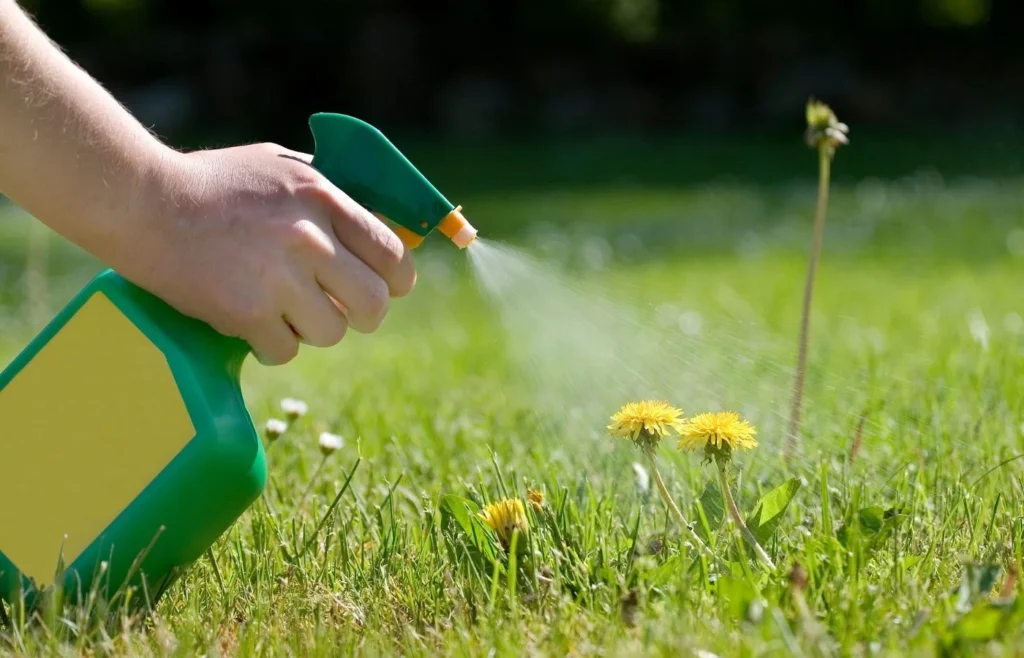Are you facing a weed invasion in your garden and tempted by the idea of using bleach? After all, this household product, known for its strong disinfectant properties, seems like an easy and quick solution to get rid of the unwanted plants.
But have you considered the consequences for your garden and the environment? Our expert gardeners are finally speaking up to provide you with concrete answers.
Bleach in the garden, good or bad idea?
Yes, bleach effectively destroys all kinds of germs in the house. But what you might not know is that, in your garden, it does more harm than good.
This chemical substance is particularly aggressive towards the soil, effectively eliminating visible weeds but also wiping out essential microorganisms that are vital for the biological balance of the ground.
Indeed, did you know that bacteria and fungi naturally present in the soil contribute to its fertility? By using bleach, you deprive your soil of these valuable allies. The result is a sterile ground where plants will struggle to grow normally after treatment.
What are the real effects of bleach on nature?
You might think that a small amount of bleach won’t hurt anyone? Beware of misleading appearances! Once poured onto your land, bleach quickly penetrates the deeper layers of soil and contaminates underground water sources and nearby waterways.
It thus becomes responsible for local water pollution and poses a real danger to aquatic ecosystems. But that’s not all! The animals and insects living in your garden are not spared either.
Bees, earthworms, and other small beneficial creatures in your garden can be poisoned or eliminated by the presence of this toxic product.
Effectiveness of bleach weeding: what to expect?
If, despite these warnings, you are tempted by this solution, it’s good to know that its effectiveness against weeds is relative. Unlike a real herbicide, bleach only attacks the above-ground parts of unwanted plants and not their roots.
In other words, the weeds you think you’ve eliminated will reappear very quickly. Meanwhile, the soil will suffer long-term damage. It can take several months or even longer for the ground to regain its natural fertility.
So, are you really willing to sacrifice your soil in the long run for a temporary solution?
What natural herbicides to use as an alternative?
Fortunately, our gardeners have tested various effective and natural methods for weeding without risking damage to the environment. Here are some simple, economical, and sustainable alternatives:
- Boiling water: simply pour it directly on the unwanted weeds. An effective and ecological elimination!
- White vinegar: spray it directly on the weeds and watch them disappear without affecting the soil quality.
- Organic mulching: dead leaves, bark, or wood chips placed on the ground prevent weeds from germinating by depriving their seeds of light.
- Hand cultivation or uprooting: it requires a bit more effort, but it is a reliable, eco-friendly, and definitive method since you remove the roots and entire plants.
These techniques have the major advantage of respecting your garden, your soil, and the biodiversity surrounding it, while remaining particularly effective in the fight against weeds.
Final verdict: keep your bleach away from the garden!
As you can see, weeding with bleach is a practice to avoid at all costs. Too aggressive for the environment, too ineffective against weeds, and harmful in the long term to the health of your garden, it doesn’t deserve a place in your gardening arsenal.
On the contrary, by adopting more natural and respectful techniques, you will not only preserve your soil but also promote biodiversity in your green space. A winning choice for you and the planet!
Have you ever considered weeding with bleach? What methods do you use to eliminate weeds in your garden? Share your experiences and tips with the community by leaving a comment below! We look forward to reading your thoughts!

